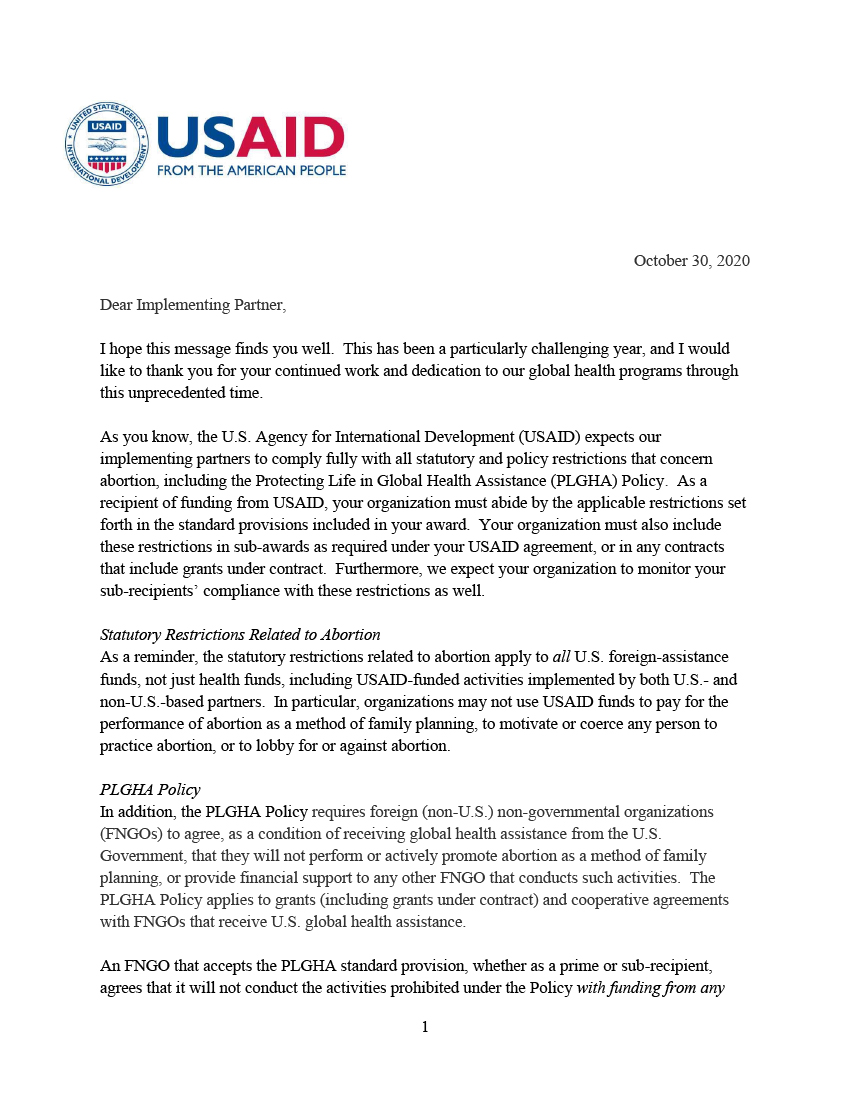Speeches Shim
Dear Implementing Partner, I hope this message finds you well.
This has been a particularly challenging year, and I would like to thank you for your continued work and dedication to our global health programs through this unprecedented time. As you know, the U.S. Agency for International Development (USAID) expects our implementing partners to comply fully with all statutory and policy restrictions that concern abortion, including the Protecting Life in Global Health Assistance (PLGHA) Policy.
As a recipient of funding from USAID, your organization must abide by the applicable restrictions set forth in the standard provisions included in your award. Your organization must also include these restrictions in sub-awards as required under your USAID agreement, or in any contracts that include grants under contract. Furthermore, we expect your organization to monitor your sub-recipients’ compliance with these restrictions as well.
Statutory Restrictions Related to Abortion
As a reminder, the statutory restrictions related to abortion apply to all U.S. foreign-assistance funds, not just health funds, including USAID-funded activities implemented by both U.S.- and non-U.S.-based partners. In particular, organizations may not use USAID funds to pay for the performance of abortion as a method of family planning, to motivate or coerce any person to practice abortion, or to lobby for or against abortion.
PLGHA Policy
In addition, the PLGHA Policy requires foreign (non-U.S.) non-governmental organizations (FNGOs) to agree, as a condition of receiving global health assistance from the U.S. Government, that they will not perform or actively promote abortion as a method of family planning, or provide financial support to any other FNGO that conducts such activities. The PLGHA Policy applies to grants (including grants under contract) and cooperative agreements with FNGOs that receive U.S. global health assistance.
An FNGO that accepts the PLGHA standard provision, whether as a prime or sub-recipient, agrees that it will not conduct the activities prohibited under the Policy with funding from any source, including non-USAID funds. The PLGHA Policy prohibits FNGOs, for example, from operating a service-delivery site that provides counseling on abortion as a method of family planning; providing advice that abortion as a method of family planning is an available option, or encouraging women to consider abortion; lobbying a foreign government to legalize or make abortion available as a method of family planning; and conducting a public-information campaign related to abortion as a method of family planning.
This letter serves to remind you that USAID’s prime implementing partners are responsible for informing their FNGO sub-recipients of the requirements of the PLGHA Policy, and for ensuring that these sub-recipients comply with the terms of the Policy. Prime partners are also responsible for determining the steps needed to ensure compliance with the PLGHA standard provision, including by their sub-recipients.
Best Practices for Ensuring Compliance
USAID’s implementing partners can take a number of steps to ensure their staff and any sub-recipients are aware of, and taking steps to ensure compliance with, the statutory and policy restrictions related to abortion. We encourage our partners to do the following:
- Promote ongoing, open communication with all parties involved in health activities, which is essential to ensuring compliance with the abortion restrictions, especially by routinely conveying information on the PLGHA Policy and other abortion-related requirements to your staff and sub-recipients, from the design of applications through the close-out of awards, through both virtual and in-person training opportunities;
- Ensure your staff and the staff of your sub-recipients annually complete the publicly available e-Learning course titled, “Protecting Life in Global Health Assistance and Statutory Abortion Restrictions,” which reviews the PLGHA Policy and other abortion-related restrictions and their applicability, discusses monitoring and compliance activities, and presents quiz questions and case studies;
- Make your sub-recipients aware of potential violations, which could relate to training, implementation, monitoring, and documentation, as well as of the possible sanctions and consequences for non-compliance, and help them to recognize vulnerabilities;
- Incorporate monitoring for compliance into your staff’s regular field visits and discussions with partners, including sub-recipients and frontline health providers; and
- Document your efforts to ensure your compliance, and that of your sub-recipients, with the statutory and policy abortion-related restrictions applicable to each award.
USAID has made a number of compliance resources available to assist our implementing partners in understanding and abiding by with these restrictions. In addition to the e-Learning course mentioned above, we encourage you to consult Answers to Frequently Asked Questions About the Protecting Life in Global Health Assistance Policy.
To maintain the fidelity of U.S. laws and policies related to abortion overseas, I am requesting you to provide documentary evidence of your efforts to assure the compliance of your FNGO sub-recipients with the PLGHA Policy by November 30, 2020. Please submit your documentation to your award’s Contract/Agreement Officer’s Representative and copy the Executive Director of GH’s Office of Policy, Programs, and Planning, Robert Siedlecki at rsiedlecki@usaid.gov.
SubAwardee Information
I also want to remind prime implementing partners of their obligations for reporting on all their sub-awards through the Federal Subaward Reporting System (FSRS), as required by the Federal Funding Accountability and Transparency Act of 2006 (FFATA). Please note that such reporting is mandatory. Your organization will soon receive further communication from USAID on the importance of compliance with this requirement.
We appreciate your efforts to ensure compliance with the statutory and policy restrictions related to abortion included in your award. If you have any questions about how the restrictions apply to your USAID grant, cooperative agreement, or contract that includes grants under contract, you should contact the Contract/Agreement Officer’s Representative and/or the Contracting/Agreement Officer for the award.
Sincerely,
Alma L. Golden, M.D.
Assistant Administrator
Bureau for Global Health
United States Agency for International Development


Comment
Make a general inquiry or suggest an improvement.